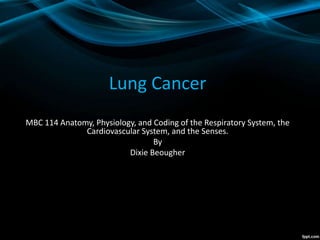
Cancer LRA
- 1. Lung Cancer MBC 114 Anatomy, Physiology, and Coding of the Respiratory System, the Cardiovascular System, and the Senses. By Dixie Beougher
- 2. What is Lung Cancer? • Lung cancer is the uncontrolled growth of abnormal cells, these cells do not carry out the function of normal cells and do not develop into healthy lung tissue. • Lung cancer is a cancer that develops in the tissues of the lung, usually the tissues lining the airways. • There are two types of lung cancer: small cell and non small cell.
- 3. Facts • Since 1964 the Surgeon General’s Report has included statistics and trials that confirm evidence on the links between smoking and lung cancer. • In the past 50 years it has become a fact that smoking and exposure to secondhand smoke increase the risk to develop lung cancer. • Smokers are 20 times more at risk than nonsmokers. • Nonsmokers who have exposure to secondhand smoke are 20% more likely to develop lung cancer than those who are not exposed to secondhand smoke.
- 4. Risk Factors Factors associated with increased risk of lung cancer • Cigarette smoking • Exposure to secondhand smoke • Radon exposure • Occupational exposure to lung carcinogens • Air pollution Interventions Associated With Decreased Risk of Lung Cancer • Smoking avoidance • Smoking cessation • Eliminating secondhand smoke • Reducing or eliminating occupational exposure to lung carcinogens • Reducing or eliminating exposure to radon
- 5. Lung Cancer cases in 2014 New cases • 224,210 Deaths • 159,260 Non small cell 85% Small cell 15% non small cell small cell
- 6. Lung Cancer Screening • Screening by low-dose helical computed tomography- 20% relative reduction in lung cancer–specific mortality and a 6.7% reduction in overall mortality • Screening by chest x- ray and/or sputum cytology- at least 95% of all positive chest x-ray screening exams (but not all) do not result in a lung cancer diagnosis False-positive exams result in unnecessary invasive diagnostic procedures.
- 7. Staging Tests & Cancer Stages • CT scan • PET scan • MRI • Bone scan The stage of lung cancer depends mainly on... The size of the lung tumor How deeply the tumor has invaded nearby tissue, such as the chest wall Whether lung cancer cells have spread to lymph nodes or other parts of the body • Occult Stage Lung Tumor No appearance on CT scan • Stage 0 Lung Tumor Abnormal cells are found only in the innermost lining of the lung. • Stage I Lung Cancer The lung tumor is an invasive cancer. The tumor is no more than 5 centimeters (about 2 inches) across. • Stage II Lung Cancer The lung tumor is smaller than 7 centimeters across, and cancer cells are found in nearby lymph nodes • Stage III Lung Cancer The tumor may be any size. More than one malignant tumor may be found within the lung. • Stage IV Lung Cancer Malignant tumors are found in both lungs.
- 8. Xray of Lung Cancer & CT scan of Lung Cancer
- 9. Treatment Surgery • Surgery may be an option for people with early-stage lung cancer. • The surgeon usually removes only the part of the lung that contains cancer(lobectomy) • Radiation Therapy • After surgery, radiation therapy can be used to destroy any cancer cells that may remain in the chest. • In advanced lung cancer, radiation therapy may be used with chemotherapy. • Radiation therapy can be used to help shrink a tumor that is blocking the airway. • Radiation therapy can be used to help relieve pain from lung cancer that has spread to the bones or other tissues. • Radiation therapy is often used to treat lung cancer that has spread to the brain. • Chemotherapy • Chemotherapy may be used alone, with radiation therapy, or after surgery. • Chemotherapy uses drugs to kill cancer cells. The drugs for lung cancer are usually given directly into a vein (intravenously) through a thin needle. Targeted Therapy • Several kinds of targeted therapy are used for non-small cell lung cancer. One kind is used only if a lab test on the cancer tissue shows a certain gene change. Targeted therapies can block the growth and spread of lung cancer cells.
- 10. Coding Lung Cancer 2014 ICD-9-CM Diagnosis Code 162.9 Regardless of the cell type, the ICD-9-CM code for primary malignant neoplasm of the lung is 162.x, with the fourth-digit subcategory identifying the specified site of the cancer. 2014 ICD-10-CM Diagnosis Code C34.90 Malignant neoplasm of unspecified part of unspecified bronchus or lung
- 11. Coding Lung Cancer Treatment • Wedge resection (32505) or thoracoscopic wedge resection is the removal of a small portion of the affected lung. This procedure should not be confused with a wedge biopsy of the lung (31628) or thoracoscopic wedge biopsy of lung (32607). Which is the removal of a small sample of lung tissue for microscopic examination. • Lobectomy (32480) is the removal of the entire lobe of the lung. • Pneumonectomy (32440) is the removal of the entire right or left lung.
- 12. Costs of care. • Average Annual Costs of Care, Lung Cancer: $60,533 (female); $60,885 (male); for individuals over age 65. • Out-of-pocket costs (OPC) and time costs (TC) for patients with stage IV non-small cell lung cancer (NSCLC) and their caregiver's averages between $323 and $8,011 per month. • Medicare does not pay for screening exams, but they will help pay for the costs of treatment.
- 13. References Center for Disease Control and Prevention Retrieved from: http://www.cdc.gov/cancer/lung/basic_info/diagnosis_treatmen t.htm National Cancer Institute –What you need to know about Lung Cancer. Retrieved from: http://www.cancer.gov/cancertopics/wyntk/lung https://www.mymedicarematters.org/staying-healthy/disease- information/cancer/medicare-coverage-cost/ http://www.fortherecordmag.com/archives/041111p27.shtml